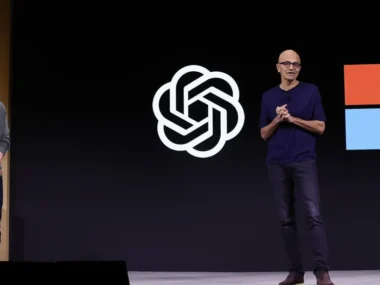A senior executive at Google has conveyed to the BBC that Artificial Intelligence (AI) technology is “extremely crucial and must be perfected.”
Matt Brittin, the President of Google for Europe, the Middle East, and Africa, has highlighted the immense potential of Artificial Intelligence (AI) to drive significant advancements in various industries. Google has recently entered into a research collaboration with the University of Cambridge. This partnership involves Google providing funding for the university’s newly established Centre for Human-Inspired AI, where researchers and scientists from both institutions will collaborate.
This long-term partnership will focus on several areas, including robotics, healthcare, and addressing climate change. It precedes the UK’s AI safety summit at Bletchley Park, where government officials aim to bring together leading figures in the AI industry.
The discussions and initiatives surrounding AI have intensified due to the ongoing debate about its potential benefits and the need for regulatory frameworks in the rapidly advancing field.
Matt Brittin stated, “If we get it right, there could be huge breakthroughs in health, the potential for unlimited, clean energy, and a society where everyone has opportunities through education and powerful, intelligent tools.”
Zoubin Ghahramani, Vice President of Research at Google DeepMind and a professor of information engineering at Cambridge University, noted that the research conducted at the new center could also contribute to addressing climate-related challenges.

Research in the fields of robotics and Artificial Intelligence (AI) is already in progress at Cambridge’s Centre for Human-Inspired AI.
Artificial Intelligence (AI) tools have been applied to optimize flight paths, reducing the creation of contrails, which are vapor trails left in the sky by airplanes. This seemingly unconventional use of AI has substantial value in mitigating the environmental impact of air travel, as noted by Professor Ghahramani.
Matt Brittin emphasized that sustainability and addressing climate issues have been long-term priorities for both Google and its AI subsidiary, DeepMind. Their research has contributed to reducing energy consumption and costs in Google’s data centers. Google has taken steps to become carbon-neutral and invest heavily in renewable energy sources.
Furthermore, Google has been involved in global initiatives like optimizing traffic lights to decrease pollution and leveraging Google Maps to find eco-friendly routes and suitable locations for solar panels.
However, it’s worth noting that some experts have expressed concerns about the environmental impact of the AI industry. The rapid growth of this sector could lead to energy consumption on a scale similar to that of a small country, prompting calls for AI to be used only when absolutely necessary to avoid excessive energy use.











